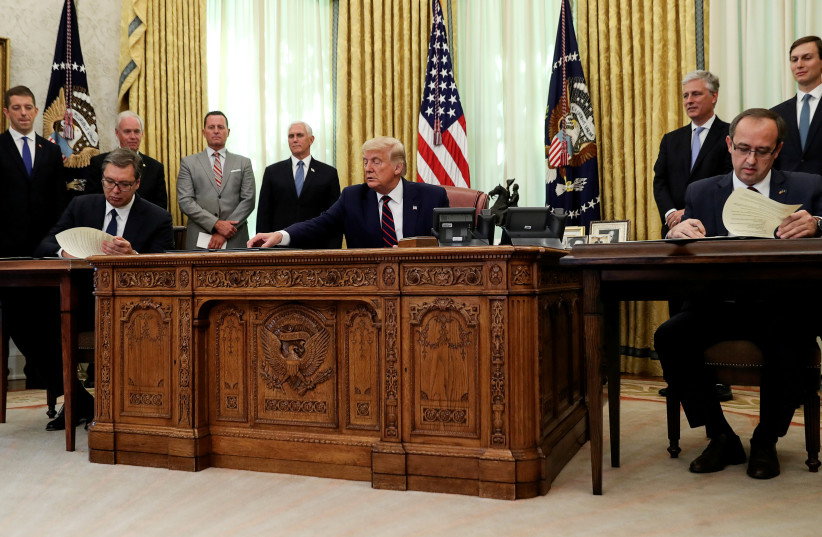Kosovo announced that it was applying to the Council of Europe on Wednesday, sparking outrage from Serbia and warnings of a "strong response."
Kosovo's Foreign Minister Donika Gërvalla-Schwarz made the announcement in a video statement, saying "Today, a new chapter unfolds for Kosovo at the Council of Europe."
"Kosovo is the most democratic, most pro-European and the most optimistic country in the region" she said. "Hence, Kosovo deserves to be a member of the Council of Europe as soon as possible. By this, the fundamental rights of Kosovar citizens are strengthened."
In response to Kosovo's announcement, Serbian President Aleksandar Vucic called a meeting of the National Security Council for Friday morning, telling reporters that Serbia had been trampling on the Brussels Agreement for 10 years and was now trampling on the Washington Agreement and United Nations Security Council Resolution 1244.
While Kosovo agreed as part of those economic normalization agreements with Serbia to place a one-year moratorium on seeking membership in international organizations, it has been over a year since September 2020, when the agreement was signed in Washington, meaning the moratorium has ended.

UNSC Resolution 1244 aimed to resolve the conflict in Kosovo in 1999 with the deployment of an international civil and military presence in Yugoslavia and the establishment of the UN Interim Administration Mission in Kosovo. Kosovo adopted a declaration of independence in February 2008 and became responsible for its own governance in 2012.
Vucic stressed that Serbia would not recognize Kosovo's independence and that "our response must be smart and wise, to preserve peace and stability, to be firm, strong and persistent in protecting our interests in the desire to reach a solution by compromise and [to] respect what has been signed," according to the Serbian Tanjug news agency.
The Serbian president added that the application would have additional effects on relations in the region and create issues. He also questioned who had persuaded Kosovo to submit a request to join the Council of Europe now.
Vucic also stated that Kosovo has received support from the US to join NATO's Partnership for Peace and claimed that Washington wants Serbia to recognize Kosovo. According to Tanjug, the Serbian president complained that "everyone thinks that they have the right to create Serbian policy and that, in accordance with daily needs and interests, they have the right to order how Serbia will behave and that they do not need a president like [Vucic]."
On Tuesday, Vucic stated that Serbia would fight for more countries to withdraw their recognition of Kosovo and that it is clear in the world today that the only principle that applies is that there are no principles, according to Tanjug.
"They are completely abolishing the international legal order," he said. "It will be interesting to see who of those who swear by respect of international law will support that. We will have a response and we will know how to protect our country strongly."
Last week, the Serbian president warned that if Kosovo were to submit a request to join the Council of Europe, "Our answer will be stronger than they think. It will not be about announcements and weapons, but about diplomatic offensives and politics – nothing else – but we will show our teeth."
Kosovo will need 31 out of the 46 members of the council to support its application in order for it to be accepted. So far, 34 members have recognized Kosovo as an independent country.
Russia has often opposed efforts by Kosovo to join international organizations, but Moscow quit the Council of Europe in March after the organization voted to exclude it due to its invasion of Ukraine.
Kosovo's foreign minister warned in an interview with The Jerusalem Post earlier this week that Russia's war in Ukraine could embolden Serbia to act militarily against Kosovo.
"We are concerned that the Balkans could be the next hot spot," Gërvalla-Schwarz said, adding that his war has given the message that "borders and ethnic problems" are on the agenda again. "In the Balkans, talking about borders and changing borders has always been a matter of war."
Last week, Kosovo and Israel signed a series of bilateral agreements in Jerusalem to strengthen cooperation in a number of fields, including culture, education, science and film co-production.
Tovah Lazaroff contributed to this report.
